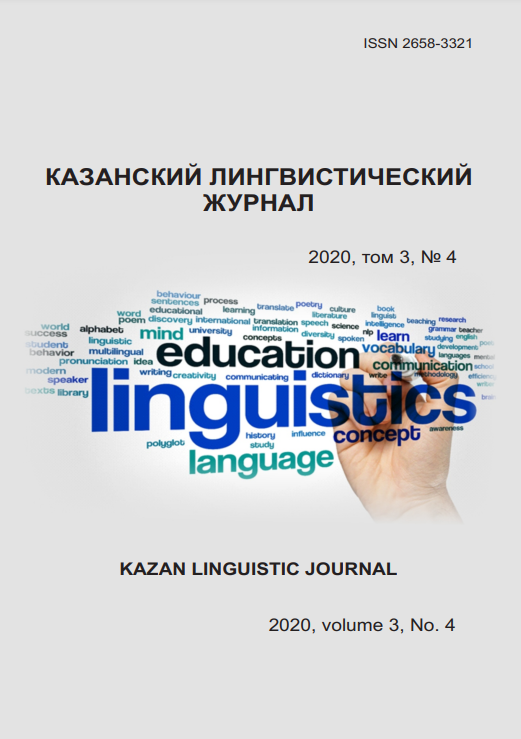Inclusive educational environment: social and communicative skills in children with special educational needs
Keywords:
inclusion, social and communication skills, foreign language, learning, communication, interactionAbstract
The paper covers the issues of theoretical frameworks that are being developing around the process of modelling social communication skills in children with special educational needs during language learning process using interactive teaching techniques in an inclusive educational environment. The relevance of this article is due to the increased attention from the world scientific and pedagogical community to the search for effective technologies for the practical implementation of the theoretical and methodological foundations of inclusion, contributing to the successful social psychological and pedagogical rehabilitation of children with special educational needs. This provision implies acquisition of vital social and communicative competencies by these children that make it possible to achieve maximum independence in the surrounding world, to gain the opportunity for productive social interaction in various spheres of life in society, as well as to gain the status of social viability in solving everyday tasks in various types of activities. However, despite numerous studies in the field of correction of psychophysical disorders in children with special educational needs, the question of the possibility of forming socio-communicative competencies in children of this category in the process of teaching a foreign language in an inclusive educational environment is not sufficiently developed. In this regard,the authors of the article focus on the issues of designing a social pedagogical model for the formation of social communication skills in children with special educational needs through teaching a foreign language, based on innovative ways of including social communication in teaching. The key results of the research are the developed model that contributes to the formation and development of social and communication skills in children; pedagogical conditions for the development of these skills; criteria for the ability to develop social and communication skills of children with special educational needs.
References
Литература
Алехина С.В. «Золотое Сечение: психологическая канва инклюзии». Инклюзивное образование. М.: Классное руководство и воспитание школьников, 2015. 224с.
Асмолов А.Г. «Стратегия развития вариативного образования: мифы и реальность». Магистр, 1995. № 1. С. 23–27.
Выготский Л.С. Собрание сочинений: в 6 т. Т.5. / под ред. Т.А.Власовой. Основы дефектологии. Москва: Педагогика, 1983. 369с.
Зайцев Д.В. Социальная интеграция детей с ограниченными возможностями: дис. ... доктора. соц. наук: 22.00.04. Саратов, 2004. 360с.
Малофеев Н.Н. Специальное образование в России и за рубежом. В 2 ч. М., 1996. 182 с.
Наумов А.А. Технологическая модель реализации инклюзивного образования в условиях общеобразовательной школы // Инклюзивное образование: методология, практика, технология: материалы международной научно-практической конференции (20¬22 июня 2011, Москва). М.: МГПУ, 2011. С.142–144.
Назарова Н. М. Системные риски развития инклюзивного и специального образования в современных условиях // Специальное образование. 2012. №3 (27). С.6–12.
Семаго Н.Я. Опыт системного развития инклюзивного образования в Центральном округе // Инклюзивное образование. Выпуск 1. М.: Центр «Школьная книга», 2010. С.18–25.
Сигал Н.Г. Современное состояние и тенденции развития инклюзивного образования за рубежом: дисс. …канд. пед. наук: 13.00.01. Казань, 2016. 206с.
Шипицина Л.М. Интеграция и инклюзия: проблемы и перспективы: материалы российского форума «Педиатрия Санкт-Петербурга: опыт, инновации, достижения» (20¬21 сентября 2010г.). СПб, 2010. 200с.
Шматко Н.Д. Для кого может быть эффективным интегрированное обучение? // Дефектология. 1999. №1. С.41–45.
Ainscow M. “From Special Education to Effective Schools for All”, Keynote presentation at the Inclusive and Supportive Education Congress, University of Strathclyde, Glasgow, 2005.
Booth T., Ainscow M., Kingstone D. “Index for inclusion developing play, learning and participation in yearly years and childcare”, Bristol, UK: Centre for Studies on Inclusive Education: CSIE, May 2011.
Stainback W., Stainback S., Bunch G. “Introduction and historical background”// In S. Stainback, W. Stainback, & Forest, M. (Eds.), Educating all students in the mainstream of regular education. Baltimore: Paul H. Brookes, 1986.
Villa R.A., Thousand J.S., Nevin A.L. “A guide to co-teaching: Practical tips for facilitating student learning (2nd ed.)”, Thousand Oaks, CA: Corwin Press, 2008.
References
Alekhina S.V. (2015). “Golden Ratio: Psychological Canvas of Inclusion”, Inclusive Education. Moscow: Klassnoe rukovodstvo i vospitanie shkol'nikov. 224p.
Asmolov A.G. (1995). “Development strategy for variable education: myths and reality”, Magistr. no.1. Pp.23–27.
Vygotskii L.S. (1983). Collected works: in 6 vol. Vol. 5. / ed. T.A. Vlasova, Fundamentals of defectology, Moscow: Pedagogika. 369p.
Zaitsev D.V. (2004). Social integration of children with disabilities: dis. ... doc. social sciences: 22.00.04. Saratov. 360p.
Malofeev N.N. (1996). Special education in Russia and abroad: In 2 parts. Part 1 Western Europe. Moscow: «Pechatnyi dvor». 182p.
Naumov A.A. (2011). “Technological model for the implementation of inclusive education in the context of a comprehensive school”, Inclusive education: methodology, practice, technology: materials of the international scientific and practical conference (June 20¬22, 2011, Moscow). Moscow: MGPU. Pp.142–144.
Nazarova N.M. (2012). “Systemic risks of the development of inclusive and special education in modern conditions ”, Special education, Vol.3, no. 27. Pp.6–12.
Semago N.Ya. (2010). “Experience of systemic development of inclusive education in the Central District”, Inclusive education. Issue 1. Moscow: Tsentr «Shkol'naya kniga». Pp.18–25.
Shipitsina L.M. (2010). “Integration and inclusion: problems and prospects “(materials of the Russian forum” Pediatrics of St. Petersburg: experience, innovations, achievements “(September 20¬21, 2010). Saint-Petersburg. 200p.
Shmatko N.D. (1999). “Who can benefit from integrated learning?”. No.1. Pp.41–45.
Sigal N.G. (2016). Current state and trends in the development of inclusive education abroad: diss. ... cand. of pedagogics: 13.00.01. Kazan'. 206p. P.9.
Ainscow M. (2005). “From Special Education to Effective Schools for All”, Keynote presentation at the Inclusive and Supportive Education Congress, University of Strathclyde, Glasgow.
Booth T., Ainscow M., Kingstone D. (2011). “Index for inclusion developing play, learning and participation in yearly years and childcare”, Bristol, UK: Centre for Studies on Inclusive Education: CSIE, May.
Stainback W., Stainback S, Bunch G. “Introduction and historical background”// In S. Stainback, W. Stainback, & Forest, M. (Eds.), Educating all students in the mainstream of regular education, Baltimore: Paul H. Brookes, 1986.
Villa R.A., Thousand J.S., Nevin A.L. (2008). “A guide to co-teaching: Practical tips for facilitating student learning (2nd ed.)”, Thousand Oaks, CA: Corwin Press.






